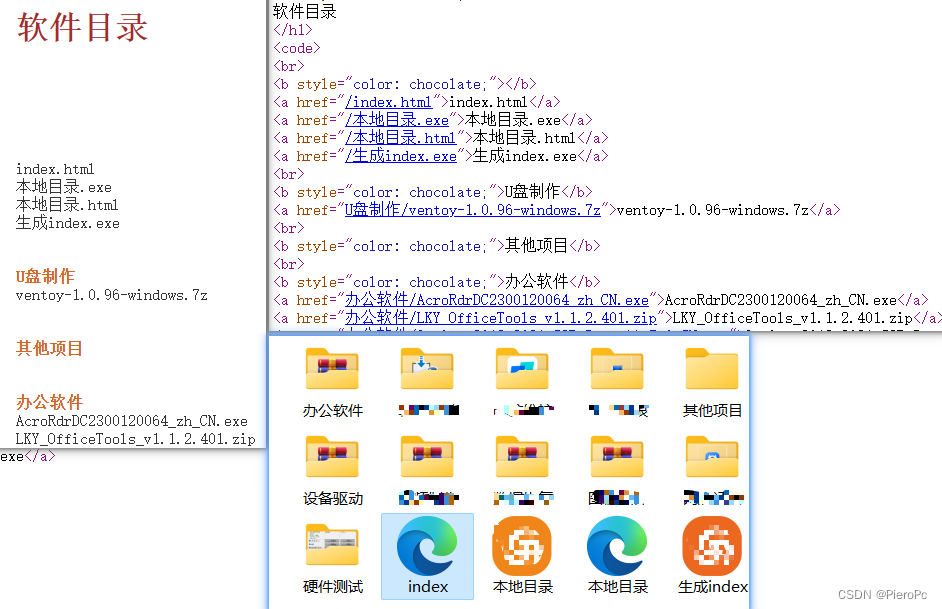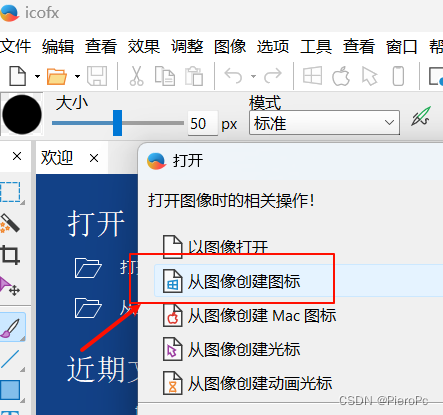Python 生成 文件目录网页 下载超链接和打开 笔记
发布时间:2024年01月19日
1. 一键生成 文件目录网页 下载超链接
?1.1 图:

1.2 代码:
(由Ai生成部分,再改成适合自己用)
index.py
# -*- coding: utf-8 -*-
import os
# import sys
path = 'E:\BIT\public\software\\'
# path = path = os.getcwd()
# path = os.getcwd().replace('\\','/')
# current_directory = os.path.dirname(os.path.abspath(__file__))
# root_path = os.path.abspath(os.path.dirname(current_directory) + os.path.sep + ".")
# sys.path.append(root_path)
# path = sys.path[0]+"\\"
# print(sys.path[0])
print(path)
f = open("本地目录.html", "w", encoding="utf-8")
f.write('<!DOCTYPE html><html lang="zh-CHS"><head><meta charset="UTF-8"><meta name="viewport" content="width=device-width, initial-scale=1.0"><style> a { color: #333; text-decoration: none}a:hover { color: #777}</style></head>\n')
f.write('<body style="padding: 50px;">\n')
f.write('<pre>\n')
f.write('<h1 style="color: brown;">\n')
f.write('软件目录\n')
f.write('</h1>\n')
f.write('<code>\n')
f.write('<br>\n')
for root, dirs, files in os.walk(path):
level = root.replace(path, '').count(os.sep)
indent = '----' * 4 * (level)
ba =os.path.basename(root)
print(ba)
f.write('{}<b style="color: chocolate;">{}</b>\n'.format(indent, os.path.basename(root)))
subindent = '<a href="' * 1 * (level + 1) + ba
for file in files:
print(file)
f.write('{}/{}">{}</a>\n'.format(subindent, file, file))
f.write('<br>\n')
f.write('</code>\n')
f.write('</pre>\n')
f.write('</body>\n')
f.write('</html>\n')1.3 二改:

f = open("index.html", "w", encoding="utf-8")
subindent = '<a href="software/' * 1 * (level + 1) + ba
# software/ 超链接地址加目录
# index.html 默认自己找
方便放入静态包里访问 http://127.0.0.1:3000/sofware2. 打包成单个exe?文件
2.1 命令如下:
pip install pyinstaller??
#?安装最新依赖包
pyinstaller -F --i logo.ico index.py
# -F?是打包成单个文件 --i xx.ico?换上自己的logo图标
2.2 ico?图标由 icofx?软件直接制成

文章来源:https://blog.csdn.net/PieroPc/article/details/135695873
本文来自互联网用户投稿,该文观点仅代表作者本人,不代表本站立场。本站仅提供信息存储空间服务,不拥有所有权,不承担相关法律责任。 如若内容造成侵权/违法违规/事实不符,请联系我的编程经验分享网邮箱:chenni525@qq.com进行投诉反馈,一经查实,立即删除!
本文来自互联网用户投稿,该文观点仅代表作者本人,不代表本站立场。本站仅提供信息存储空间服务,不拥有所有权,不承担相关法律责任。 如若内容造成侵权/违法违规/事实不符,请联系我的编程经验分享网邮箱:chenni525@qq.com进行投诉反馈,一经查实,立即删除!
最新文章
- Python教程
- 深入理解 MySQL 中的 HAVING 关键字和聚合函数
- Qt之QChar编码(1)
- MyBatis入门基础篇
- 用Python脚本实现FFmpeg批量转换
- 微信小程序中wx:if 和 hidden的区别
- 基于支持向量机SVM的界面黏附能预测,SVM的详细原理,SVM工具箱使用说明
- 交换排序 -- 冒泡排序、快速排序
- Meta将继续开源Llama 3;Runway多动态刷头Multi Motion Brush
- C# 将 Word 转化分享为电子期刊
- 【MySQL】创建和管理表
- 数字化指南:数据可视化助力网店腾飞
- web学习笔记(十四)
- 【嵌入式开发 Linux 常用命令系列 4.2 -- git .gitignore 使用详细介绍】
- 大数据时代的新命题:谁在满足中国企业的实时性需求?